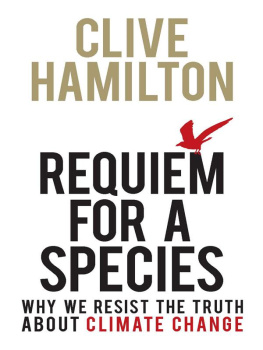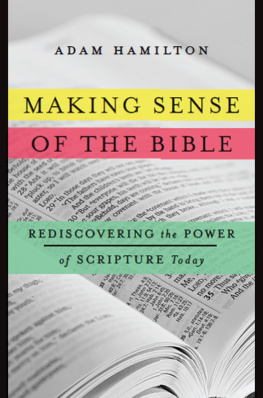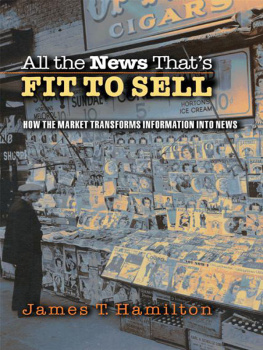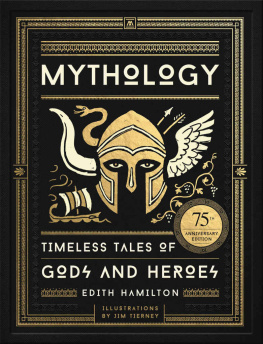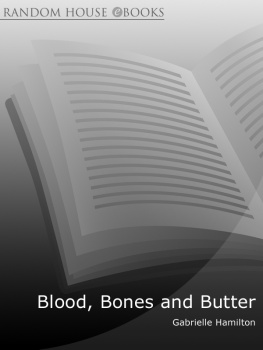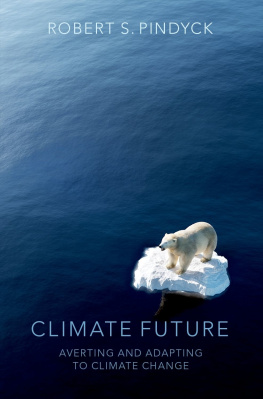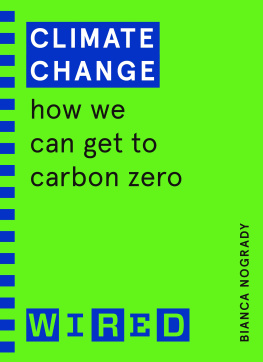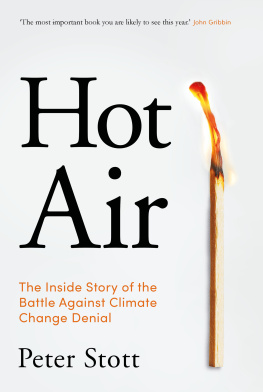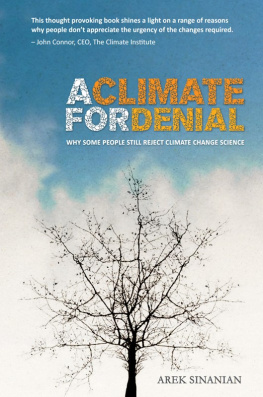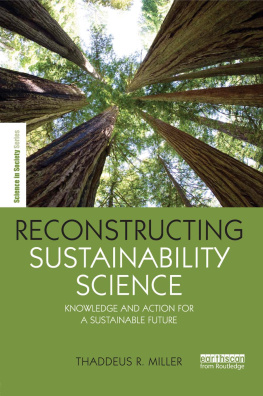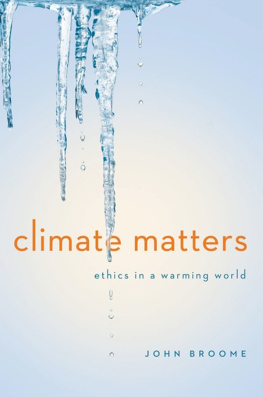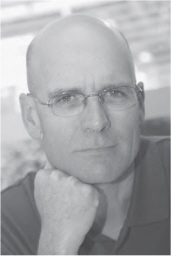
Clive Hamilton is the bestselling author of Affluenza, Growth Fetish and Scorcher, and co-author of SilencingDissent. One of Australias leading thinkers, he is Charles Sturt Professor of Public Ethics at the Centre for Applied Philosophy and Public Ethics, based at the Australian National University.

REQUIEM
FOR A
SPECIES
WHY WE RESIST THE TRUTH
ABOUT CLIMATE CHANGE
CLIVE HAMILTON

Faust: Part One by Johann Goethe, translated by Philip Wayne, Penguin Classics, 1949. Reproduced by permission of Penguin.
Australia 1970 from Judith Wright Collected Poems, 19421985, Angus & Robertson, Sydney, 2002. With permission.
First published in Australia in 2010
Copyright Clive Hamilton 2010
All rights reserved. No part of this book may be reproduced or transmitted in any form or by any means, electronic or mechanical, including photocopying, recording or by any information storage and retrieval system, without prior permission in writing from the publisher. The Australian Copyright Act 1968 (the Act) allows a maximum of one chapter or 10 per cent of this book, whichever is the greater, to be photocopied by any educational institution for its educational purposes provided that the educational institution (or body that administers it) has given a remuneration notice to Copyright Agency Limited (CAL) under the Act.
Allen & Unwin
83 Alexander Street
Crows Nest NSW 2065
Australia
Phone (61 2) 8425 0100
Fax: (61 2) 9906 2218
Email: info@allenandunwin.com
Web: www.allenandunwin.com
Cataloguing-in-Publication details are available from the National Library of Australia
www.librariesaustralia.nla.gov.au
ISBN 978 1 74237 210 5
Typeset in 11/14.5 pt Adobe Garamond by Midland Typesetters, Australia
Printed and bound in Australia by McPhersons Printing Group
10 9 8 7 6 5 4 3 2

CONTENTS
In preparing this book I have been more than usually reliant on the expertise of others. Drafts of the first chapter have been read by a number of experts in climate scienceAlice Bows, Graeme Pearman and Mike Raupach. David Spratt also provided very helpful insights. As the argument of the book depends on the science reported in Chapter 1, I am greatly indebted to them.
Chapter 4, on forms of denial, has benefited greatly from comments provided by Tim Kasser, Robert Manne, Tony Leiserowitz and Scott Cowdell.
Chapter 5, on our disconnection from Nature, has been thoroughly enriched by comments from my colleagues Wayne Hudson, James Haire and Scott Cowdell, as well as from participants in seminars at the Centre for Applied Philosophy and Public Ethics at the Australian National University and the School of Forestry and Environmental Studies at Yale University. I also benefited from discussions with Mary Evelyn Tucker and John Grimm.
Chapter 7, a report on a conference at the University of Oxford, has been improved after comments on a draft from Peter Christoff, David Karoly and Mark Stafford Smith.
Chapter 8, the most difficult to write, has benefited from comments provided by Scott Cowdell and David McKnight.
I would like to extend special thanks to Andrew Glikson, who provided helpful advice throughout, particularly on the science, and Cordelia Fine, who generously devoted time to reading most of the manuscript and providing feedback.
Im grateful to Gus Speth for facilitating a visit to Yale University where a large portion of the book was written. Charles Sturt University has shown an admirable commitment to promoting public debate by providing me with the freedom to research and write this book unencumbered by other obligations.
As always, Elizabeth Weiss at Allen & Unwin has been a fount of support and good advice. The teams at Allen & Unwin and Earthscan have been a pleasure to work with.
Sometimes facing up to the truth is just too hard. When the facts are distressing it is easier to reframe or ignore them. Around the world only a few have truly faced up to the facts about global warming. Apart from the climate sceptics, most people do not disbelieve what the climate scientists have been saying about the calamities expected to befall us. But accepting intellectually is not the same as accepting emotionally the possibility that the world as we know it is heading for a horrible end. Its the same with our own deaths; we all accept that we will die, but it is only when death is imminent that we confront the true meaning of our mortality.
Over the last five years, almost every advance in climate science has painted a more disturbing picture of the future. The reluctant conclusion of the most eminent climate scientists is that the world is now on a path to a very unpleasant future and it is too late to stop it. Behind the facade of scientific detachment, the climate scientists themselves now evince a mood of barely suppressed panic. No one is willing to say publicly what the climate science is telling us: that we can no longer prevent global warming that will this century bring about a radically transformed world that is much more hostile to the survival and flourishing of life. As I will show, this is no longer an expectation of what might happen if we do not act soon; this will happen, even if the most optimistic assessment of how the world might respond to the climate disruption is validated.
The Copenhagen Conference in December 2009 was the last hope for humanity to pull back from the abyss. But a binding commitment from the major polluting nations to shift their economies immediately onto a path of rapid emission cuts proved too hard. In light of the fierce urgency to act, there was a sense at the Copenhagen conference that we were witnessing not so much the making of history, but the ending of it.
Some climate scientists feel guilty that they did not ring the alarm bells earlier, so that we could have acted in time. But its not their fault. As I will argue, despite our pretensions to rationality, scientific facts are fighting against more powerful forces. Apart from institutional factors that have prevented early actionthe power of industry, the rise of money politics and bureaucratic inertiawe have never really believed the dire warnings of the scientists. Unreasoning optimism is one of humankinds greatest virtues and most dangerous foibles. Primo Levi quotes an old German adage that encapsulates our psychological resistance to the scientific warnings: Things whose existence is not morally possible cannot exist.
In the past, environmental warnings have often taken on an apocalyptic tone, and it is to be expected that the public greets them with a certain weariness. Yet climate change is unique among environmental threats because its risks have been systematically understated by both campaigners and, until very recently, most scientists. Environmental campaigners, naturally optimistic people, have been slow to accept the full implications of the science and worry about immobilising the public with too much fear. With the growth of global greenhouse gas emissions now exceeding the worst-case scenarios of a few years ago, and the expectation that we will soon pass tipping points that will trigger irreversible changes to the climate, it is now apparent that the Cassandrasthe global warming pessimistsare proving to be right and the Pollyannasthe optimistswrong. In the Greek myth Cassandra was given the gift of prophecy by Apollo, but when she failed to return his love Apollo issued a curse so that her prophecies would not be believed. I think the climate scientists, who for two decades have been sending warnings about global warming and its impacts, must sometimes feel like Cassandras cursed by Apollo, and never more so than now.
Next page
